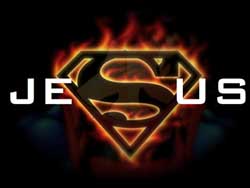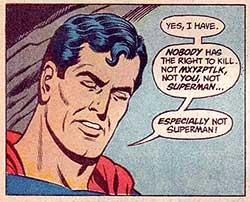Is Warner Brothers proclaiming a false Christ? And why?
I went to see the movie Man of Steel. It’s fine enough as a movie in that superhero genre. But the main distraction for me was the heavy-handed, in-your-face Bible story, Jesus story.
We realise that the original superman comic books were the creation of two Jewish highschool students, Jerry Siegel and Joe Shuster. The Jewish themes have always been obvious, and the Jesus overtones have always been there too. His name, Kal-El, gives it away, with El being one of the Hebrew names for God that keeps turning up in the Bible: Israel, Samuel, Michael, Daniel. Kal-El. In this movie the Moses in the basket scene, as he is sent from Krypton, is obviously overdone. But we always knew it was there.
The Jesus story, in Man of Steel, is laid on in truckloads. He has an unusual conception and is raised by a step-dad.
There is obviously his talking to his Father. He hides his supernatural gifts until he reveals himself when he is in his 30s. And then, after performing many great deeds – wait for it… at the age of 33 he hands himself over to the authorities. And is shackled before being interrogated.
The Father says to the Son: “You can save them all”, at which point the Son is seen in a grand, arms-extended, crucified pose.
He is called to be a bridge, making both the human world and the world he comes from one in himself. [This reduces the Docetist tendencies in the superman tradition].
The church as the Body of Christ is alluded to in the body of the Son being composed of many individuals – in fact, all possible individuals.
The sermons in the movie come thick and fast: take a leap of faith. Faith comes before trust. Whether having a moral conscience weakens a person.
 In the movie, it got to the ridiculous when Clark Kent agonises over which choice to make. He does so in a church, in the presence of a priest while, behind him, there is a stained glass window of Jesus agonising over his decision in the Garden of Gethsemane. Jesus in the stained glass window has a red cape.
In the movie, it got to the ridiculous when Clark Kent agonises over which choice to make. He does so in a church, in the presence of a priest while, behind him, there is a stained glass window of Jesus agonising over his decision in the Garden of Gethsemane. Jesus in the stained glass window has a red cape.
I was reeling from all this, and couldn’t work out what the producers of the movie thought they were doing! I am still not sure.
The stuff you use to fill the pews
When I went online to do some research on this – it got worse. Much worse. Not only is it on purpose – that’s pretty obvious; it is SO overt it couldn’t possibly be accidental. Holywood studio Warner Brothers teamed up with a specialist marketing firm and, as part of that, they have produced a sophisticated website for unintelligent pastors who are not able to make the in-your-face connections. There is a nine-page pamphlet “Jesus – the Original Superhero”. There are not just sermon ideas and outlines, but whole sermons there – a number of them. Complete with powerpoint images and video clips – “show the following video clip now”, and so on. All with the tagline, “The stuff you use to fill the pews“!!!
Father’s voice: Goodbye my son. My hopes and dreams travel with you.
Another voice: He will be an outcast. They will kill him.He will be a god to them.
You are the answer son. You are the answer to are we alone in the universe?
I have to believe that you were sent here for a reason.
You will give the people of earth an ideal to strive towards.They will rest behind you. They will stumble. They will fall.
But in time they will join you.
In time you will help them accomplish wonders.
There are special showings of Man of Steel for pastors to see the film for free.
What is going on here? As I’ve already said: I am not totally sure, but – I seriously think that it is worth pausing and at least noticing and asking the question, “what is going on here?” Because even comic-book fans are entering the debate (see, for example, here and here). Because Superman kills. That is contrary to the Superman canon. There is a famous superman quote: “Nobody has the right to kill, …not even superman, especially not superman!” In this film he doesn’t just kill one person. There are interminable battles; Metropolis is devastated. Thousands are killed without much thought and with no regret following. Some describe the scenes of devastation as disaster porn.
 What is ultimately being presented in the movie Man of Steel is the very opposite saviour message of the Man of Nazareth. Man of Steel is teaching that our salvation is by force – by us being stronger than them. Might, power, weapons, fighting – these are what we need to do. If thousands of innocents die as collateral damage, we do that without second thought. If whole cities are destroyed, we do that without second thought.
What is ultimately being presented in the movie Man of Steel is the very opposite saviour message of the Man of Nazareth. Man of Steel is teaching that our salvation is by force – by us being stronger than them. Might, power, weapons, fighting – these are what we need to do. If thousands of innocents die as collateral damage, we do that without second thought. If whole cities are destroyed, we do that without second thought.
How different that is to the way of Jesus, the spirit of gentleness, and of service, of bearing another’s burdens, of boasting only in the cross, of words of peace.
I do not know what Warner Brothers think they are up to and why they are putting such energy into getting churches to be part of telling this new story. A god of might, power, destroying enemies is popular in many communities, preaching, and singing. The Warner Brothers Man of Steel false Christ imaging hooks straight into that at a time of debates about gun control, escalation of Middle East instability, and longer-term preparations for the next Presidential elections in USA. The movie stresses that this is an American saviour.
I’m not advocating some sort of conspiracy-theory approach to life. What I am advocating is that we do not drift through life and accept whatever story other people insert us into.
There is a moment of authentic Christ image in the Man of Steel movie – ironically the moment when the possible use of supernatural power is restrained in love for the greater good focuses not around Clark Kent, but is an action by his human foster dad.





Thank you very much for the in-depth analysis. I am less and less inspired to see this film, or recommend it.
Interesting analysis…Question is: Does WB see it that way or somehow a hidden plot device for subliminal effect as comic writers may call it?
Me, I don’t share that view maybe because I grew up with comics, and the fact about comics is always they make that attempt to represent the best of what we can be even if what we see in reality is not so…These heroes embody what we want to be at our best because the real “us” is actually struggling to get to that…
Just my opinion because I am part of the crowd that loves stories that are portrayed in comics…
Thanks for your comment, Arvin. I have no way of knowing what WB sees as going on here – but their production of the website does increase the interest in the question. Blessings.
That’s the thing…WB is the parent company of DC Comics, the comics that brings Superman, but does that mean that the parent company (WB) made known to the subsidiary (DC) about this rather peculiar strategy that was used to promote the movie, and supported it or not? This is a curious case indeed…
Arvin: I don’t know if Warner Bros. is trying to change the Christian Narrative, but they are trying to market a movie. So much so, that they emailed many, many preachers in the US encouraging them to preach on the movie the weekend it was released – Father’s Day. It is a rather underhanded way of marketing.
Now that I didn’t know…DC is part of WB but does that mean that they share the same viewpoint with the WB which is their parent company?…That info does make sense…
Looks like WB have discovered the “Christian” audience and are trying to market their movie to that audience. I suspect its overt marketing trying to make a bit more of a buck.
Let us hope and pray, Claudia, that that is all they are trying to do. Blessings.
As a marketer, all I can say is that they’re targeting in on an audience that they can easily exploit. What better way to get people into the theaters than by getting an OK from the local pastor? Unfortunately, many preachers are dense enough to fall for it, because they’ll see it as Hollywood reaching out to them – and not as the underhanded exploitation that it truly is.
I would NEVER have considered seeing this movie. It’s just not my type.
But NOW, I am simply horrified!
Christians are a pretty forgiving lot. Though this takes the cake in my book.
But to put this in another context, consider if a cartoon character had been compared in a movie to Mohammed. All HELL would break loose! Fatwas would be ordered against the director and possibly the actors. (Fatwa is a decision that a crime against Islam has occurred – meriting DEATH.)
I think the above example really helps us see how disrespectful this movie is. If pastors are conned into urging young people to see the movie, and some will be, it’s a sad commentary on pastors and religious education.
Good thing you saw this movie, Bosco. And hopefully (and other mentors of the students in your college) will spark some good discussions about its content and their own faith.
Re WB’s marketing, I’m not surprised. Maybe I’m too cynical.
Re the violence and death. Superman kills only one person; to blame him for the destruction of Metropolis is a false reading of the film — he was trying to save Metropolis from Zod. And if we’re going to realistically portray how things would pan out if such beings were to meet, it ends either in surrender or death. And some villains do not exist to reconcile with their neighbours.
Re violence in superhero films and comics at large. In the world of superheroes, especially DC and Marvel, evil is externalised. This means that, while some heroes might have moral quandaries at times (and when Superman breaks that one rule, you can tell he struggles against it, and also suffers emotional turmoil as a result), there is a tension between such realism and the idea of combating evil that means you use fists, or hammers, or batterangs, or lasers out of your eyes, or a suit of armour, or a ring that can materialise things out of thin air or what-have-you. So the physical violence is often representative of the psychological and spiritual warfare we all wage on a daily basis. It is typological and such if we choose to read it that way.
Anyway, Superman’s not really the best Christ typology out there, and certainly not in Man of Steel, but I’m concerned that people are automatically turning against the film for its violence in that regard. The Lord of the Rings novel has three Christ types (although Tolkien would probably deny it), and two of them (Aragorn, the hidden king who comes to serve, and Gandalf, the resurrected Rider on the White Horse) are warriors. One of my friends prefers to think of Superman as a Christian-type — and so, if one believes in just war theory, what else was Kal-El to do, regardless of what the filmmakers attempted to reel in the Christian market?
Thanks, Matthew, for these thoughtful points.
Yes, directly Superman only kills Zod. Indirectly, in the fight, building after building is affected. Are you suggesting all those buildings are totally unoccupied, so that there is no collateral damage as I suggest? The approach very quickly unearths “the end justifies the means”. Most importantly IMO is the reflection and discussion around the film. Blessings.
Well, there was a huge alien laser devastating the city for a good while before Superman showed up, so it stands to reason anybody intelligent would have gotten far away if they could have. Snyder has also commented that the sequel to MoS will very obviously have to deal with what effect Superman’s presence on earth has on the rest of the planet–for example, leveling a city in a fistfight.
As for Superman killing, it does have precedence in the comic books–with Zod himself. Superman executed the 3 phantom zone criminals via kryptonite in an instance where no court was available and the matter had to be settled immediately. He still has nightmares about it, and swore never to kill again, no matter what.
This brings up the old argument about whether Batman should kill the Joker, et al. If you know the villain will escape and wreak havoc again, are you morally responsible for the lives he takes in the future? That’s a real question.
We also have to remember that God Himself does not shy away from battle when it serves His purposes. He is “the Lord, mighty in battle.” Christ is the Captain of the armies of the Lord. A Christ figure engaging in battle is not alien to Scripture, depending on the context of that violence.
We may be uneasy about the marketing surrounding the film, but as you note it is up to intelligent pastors and church leaders to realize that every Christ-figure but Christ Himself is ultimately a false Christ, and prepare accordingly.
Bosco,
Re the buildings, I think I misread you. I, too, was bothered by the fact that here was an instance where Superman could possibly have taken the fight out of the city but didn’t seem to try. Kal-El vs Zod isn’t like the Avengers where the final showdown must take place in the city because the city is the target; Superman is Zod’s target, so theoretically maybe he could have moved the fight elsewhere.
Thanks, Matthew. I hadn’t thought it through as far as you have here – so that is very helpful. Blessings.
I respect your view and that it is how you feel and perceive it, however I think it can be silly to get all Daily Mail about allusions to Jesus in creative works. In case it escapes anyone’s notice, the archetype is so strong it has been played out again and again in literature and pop culture… even when written by atheists.
I think recent forays into the Superman mythos have clearly channeled Christ like never before – in both Superman Returns and Smallville, you have a sacrificial hero who even “dies” and is resurrected… complete with empty tomb/hospital room.
I happen to share the view of a friend of mine who believes we should have a “permeable shield”. Take what you can positively use (I particularly liked the Gethsemane scene), but filter out the negative and make clear where the failings/drawbacks are. That strategy has served me well when say, alluding to Doctor Who – which is in no way a Christian focused family drama, when preaching.
When Paul went to Athens, he saw ONE shrine that he could use to glorify the name of the one true God and used that to advance the Gospel. He didn’t endorse the entire pantheon, he just cherry picked the good.
I happen to think the ill received Superman Returns covers the Jesus territory better.
I guess I’m drawn to Philippians 1 when thinking of this. People are preaching Christ out of false motives… and in a deeply flawed manner… but still Christ is being preached… and if we can stand there and point out the difference between what is good and what is erroneous, rather than going into tabloid rage… I think we provide a better service to God.
Many people like to point to the Matrix as another allusion to Jesus and yet when you look much more closely at the theology in that… it’s way more stacked towards gnosticism.
I too have problems with the violent ending to Man of Steel… but film critics are quick to point out that this is a growing and worrying trend in cinema generally… no matter how good & meaningful the first few acts are… the final one descends into a meaningless fist fight or battle, and perhaps this says something about audiences in general that we should be worrying about.
I guess to sum up, I can see your view and totally respect where you are coming from… but I’m not entirely on the same page… I’m sort of on the first paragraph of the page after as well.
Hope that makes sense.
The only bit I disagree with you, Nick, is that I think I am on the same page as you. I point out the similarities of the movie to the Christ story, and I also point out where the Christ story differs. I have taught the Matrix at secondary and tertiary ever since it first came out (if you follow me on twitter you will have picked that up from my profile background). Blessings.
That’s fair enough, I think it’s some of the other replies that may be amplifying/distorting my interpretation of what you are saying. I personally think there’s some overreaction i the reactions.
In the US Jesus *is* now an American Saviour: there is a tremendous amount of translation from Jesus man who denounces violence and materialism vs. the potential violence of gun ownership or the goodness of material wealth, for example.
All religion is syncretic and any attempt at creating ‘epic’ art is going to include the same models of archetype as our religions.
And for people who think a more simplistic approach is appropriate, two cases recently in the US of parents who chose to treat their sick child via prayer rather than medical treatment http://www.huffingtonpost.com/2013/07/03/madeline-kara-neumann-prayer-death_n_3539974.html
http://www.huffingtonpost.com/2013/06/12/herbert-catherine-schaible-faith-healing-parents_n_3426944.html
In the second case unbelievably it’s their second child to die this way.
There has to be some balance somewhere…